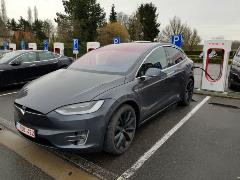BY PHILIP DE PAEPE (FLEET)
There are many contradictory studies and reports on the ecological footprint of electric cars. It has become a nonsense debate in which supporters and opponents bombard each other with arguments. But who is actually right? This is what Europe wanted to know, which is why the European Environment Agency (EEA) carried out an in-depth study for the European Commission. The result: an extensive 80-page piece of work that shows the Life Cycle Assessment (LCA) of all types of electric vehicles and compares it to those with combustion engines.
Let us take the CO2 debate for what it is – it cannot be denied that electric cars will always be better for public health locally. They do not emit any emissions except fine dust from the tyres and brake pads. However, if you take a broader view – and CO2 does become an important factor – there is still a great deal of discussion about the total ecological footprint of electric cars and their batteries. Sceptics talk about the polluting production of batteries, extraction of raw materials in conflict areas, they ask questions about the recycling of batteries and then there is the matter of electricity production. Because plugging an electric car into a network that uses coal for energy production ... well that is just shifting the problem.
Fewer greenhouse gases and there is still margin...
In this study, the EEA conducted thorough work and the report maps out the various stages of electric vehicles: raw materials, production, use and end-of-life (i.e. recycling). The definition of electric vehicles has been used as broad as possible: Battery Electric Vehicle (BEV), Plug-In Hybrid Electric Vehicle (PHEV), Range extended electric vehicles (REEVs), Hybrid electric vehicles (HEVs) and Fuel cell electric vehicles (FCEVs).

One of the first findings is that the production of electric vehicles generates 1.3 to 2 times more greenhouse gases than combustion engine cars. However, electric vehicles more than compensate for on the road. Based on the European Electricity Mix (an average of all forms of energy generation), the electric car emits between 17% and 21% fewer greenhouse gases than diesel cars and between 26% and 30% fewer than petrol cars. The report's conclusion is therefore clear: even in the current context of energy production, using electric cars is always advantageous. And because European electricity production is rapidly becoming greener, the report estimates that by 2050 electric cars will already be 73 percent more climate-friendly than vehicles with an internal combustion engine.
Public health

Electric vehicles are also significantly better for local air quality, the report states. Since the engines do not have an exhaust, they do not emit nitrogen oxides, particulates or sulphur dioxide. The energy mix again plays an important role: in countries where a lot of 'dirty' energy is still produced, the difference is smaller because coal-fired power stations in particular also emit unhealthy substances.
Electric cars, like other cars, also emit fine dust through wear and tear of the road surface, the tyres and the brake pads. However, they produce much less noise pollution, especially in cities where traffic is slower or often stationary.
Production
The impact of production is not yet clear: the production process can be both dirtier and cleaner than that of a conventional car, according to the report. It is clear, however, that the production of the battery has a higher impact, due to the mining of materials such as copper and nickel. The batteries may also contain toxic substances. The study was based on the battery technology that is currently predominantly used on the market, i.e. Li-ion batteries. As new technologies (lithium-oxygen, sodium-ion or aluminium-ion, etc.) are being developed, this could further reduce the environmental impact of electric cars in the future. The report also mentions the fact that China is now dominant on the market in the field of raw materials needed for the production of batteries. This carries the same risk of dependence as is the case today with oil. That is why the report also states that recycling is essential, both from an ecological and an economic point of view.
Conclusion

Is this the study that provides a definitive answer on the ecological footprint of the electric car? It certainly contains figures that put the electric car in a good light. On the other hand, this study also remains rather vague on a number of – not insignificant – issues. The European Electricity Mix is one of them. Major countries such as Germany still rely on coal-fired power stations for their energy supplies, which makes electric cars much less favourable. If electric cars are to develop their full potential, this will only be possible in the context of green energy production. We also read recommendations about recycling, but not about the extent of recycling or how to tackle the issue.
The ultimate study? No, but still enough figures to convince us that electric cars will, in the long run, gain the upper hand whilst being environmentally friendly.